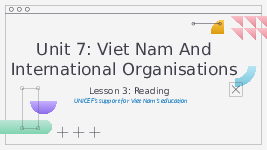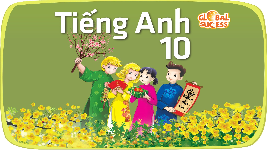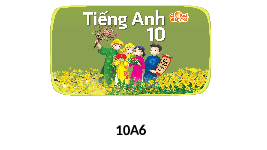



















Preview text:
Unit Unit 1 FAMILY LIFE 1 FAMILY LIFE LESSON 3 READING
Benefits of doing housework Unit Unit 1 OBJEC Famil TIVEy S Life
By the end of this lesson, students will be able to:
- Read for specific information in a text about the benefits of doing housework for children
- Understand the topic-related words introduced in previous lessons
- Use the topic-related words in meaningful contexts LESSON 3 READING Unit WARM-UP GAME: Who’s in charge?
Task 1: Look at the picture and answer the PRE-READING questions. • Task 2: Read and tick. WHILE-READING
• Task 3: Read the text again and answer the questions. POST-READING Task 4: Discuss the question. • Wrap-up CONSOLIDATION • Homework LESSON 3 READING Unit WARM-UP GAME: Who’s in charge? WARM-UP How to play? - Work in 4 groups.
- In 3 minutes, list down (as much as possible)
housework that you think mom, dad and kids usually do.
- After you finish, 1 representative from each group comes and writes on the board.
- The 1st group to finish says ‘STOP THE BUS’ and the others stop writing. LESSON 3 READING Unit WARM-UP GAME: Who’s in charge?
Task 1: Look at the picture and answer the PRE-READING questions. PRE-READING 1
Work in pairs. Look at the picture and answer the questions.
1. What is each person in the picture doing?
→ The mother is cooking; the father is laying the
table; the son is cleaning (vacuuming) the floor;
the daughter is washing vegetables.
2. Do you think that they are happy? Why or why not?
→ The people are happy because they are doing
housework together and all the family members
are sharing the household chores. LESSON 3 READING Unit WARM-UP GAME: Who’s in charge?
Task 1: Look at the picture and answer the PRE-READING questions. • Task 2: Read and tick. WHILE-READING
• Task 3: Read the text again and answer the questions. WHILE-READING 2
Read the text and tick the appropriate meanings of the highlighted words. 1. responsibility 4. bonds a. duty a. close connections ✓ ✓ b. hobby b. common interests 2. gratitude 5. character a. the feeling of being great
a. qualities that make a person the same as others
✓ b. the feeling of being grateful
✓ b. qualities that make a person different from others 3. strengthen a. make something stronger ✓
b. make something more difficult WHILE-READING Vocabulary
1. responsible /rɪˈspɒnsəbəl/ (adj) có trách nhiệm
2. gratitude /ˈɡrætɪtʃuːd/ (n) lòng biết ơn
3. strengthen /ˈstreŋθən/ (v) củng cố, làm mạnh 4. bond /bɒnd/ (n) mối liên kết
5. character /ˈkærəktər/ (n) tính cách WHILE-READING 3
Read the text again and answer the questions.
1. What do most people think about housework?
2. Why don’t many parents make their children do housework?
3. What are some important life skills children can learn when doing housework?
4. What do children learn as they finish household tasks that they don't enjoy?
5. Why does sharing housework strengthen family bonds? WHILE-READING 3
Read the text again and answer the questions.
1. What do most people think about housework?
→ Most people think that housework is boring and is
the responsibility of wives and mothers only.
2. Why don’t many parents make their children do housework?
→ They want to give their children more time to play or study.
3. What are some important life skills children can learn when doing housework?
→ These are doing the laundry, cleaning the house, and taking care of others. WHILE-READING 3
Read the text again and answer the questions.
4. What do children learn as they finish household tasks that they don't enjoy?
→ They learn that they have to try to finish their
tasks even though they do not enjoy doing them
5. Why does sharing housework strengthen family bonds?
→ Because children learn to appreciate all the hard work their parents do around the house for them.
They also start treating doing household chores as special moments shared with their parents. LESSON 3 READING Unit WARM-UP GAME: Who’s in charge?
Task 1: Look at the picture and answer the PRE-READING questions. • Task 2: Read and tick. WHILE-READING
• Task 3: Read the text again and answer the questions. POST-READING Task 4: Discuss the question. POST-READING 4
Work in pairs. Discuss the question.
What benefits do you think you
can get from sharing housework? LESSON 3 READING Unit WARM-UP GAME: Who’s in charge?
Task 1: Look at the picture and answer the PRE-READING questions. • Task 2: Read and tick. WHILE-READING
• Task 3: Read the text again and answer the questions. POST-READING Task 4: Discuss the question. • Wrap-up CONSOLIDATION • Homework CONSOLIDATION 1 Wrap-up What have we learnt today?
- Read for specific information in a text about the benefits of doing housework for children
- Understand the topic-related words introduced in previous lessons
- Use the topic-related words in meaningful contexts CONSOLIDATION 2 Homework
• Do exercises in the workbook
• Prepare for the next lesson: Speaking
Website: sachmem.vn
Fanpage: facebook.com/sachmem.vn/
Document Outline
- Slide 1
- Slide 2
- Slide 3
- Slide 4
- Slide 5
- Slide 6
- Slide 7
- Slide 8
- Slide 9
- Slide 10
- Slide 11: Vocabulary
- Slide 12
- Slide 13
- Slide 14
- Slide 15
- Slide 16
- Slide 17
- Slide 18
- Slide 19
- Slide 20




